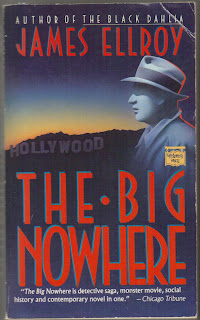 Welcome to Los Angeles, CA, New Year's Day, 1950. The century's half-way point is marked by a grim discovery in West Hollywood: a male corpse, eyes torn out, body riddled with strange bite marks, genitals mauled. Deputy Danny Upshaw, not yet thirty, eager to prove his skill and talent as an LAPD detective, bribes a celebrity coroner so he can examine the body himself... and begins a case that will open a whole wide world of depravity, corruption, vengeance, and death. Happy New Year, and welcome to Hell.
Welcome to Los Angeles, CA, New Year's Day, 1950. The century's half-way point is marked by a grim discovery in West Hollywood: a male corpse, eyes torn out, body riddled with strange bite marks, genitals mauled. Deputy Danny Upshaw, not yet thirty, eager to prove his skill and talent as an LAPD detective, bribes a celebrity coroner so he can examine the body himself... and begins a case that will open a whole wide world of depravity, corruption, vengeance, and death. Happy New Year, and welcome to Hell.Oh, yes, this is a James Ellroy novel. This is The Big Nowhere. I can't imagine anyone familiar with contemporary crime literature not knowing his name, for James Ellroy single-handedly resuscitated the mystery-noir novel in the late-80s (and continues to astonish with his work today). With his penchant for hipster-cop slang, clipped, vivid prose, extreme violence and gore, complicated and lengthy novels, and dozens upon dozens of characters, Ellroy upped the ante for what mystery novels could do and be. This is not escapist fiction--you will probably never encounter a world as dark and unrelenting, or as morally repugnant, as the one depicted in his so-called L. A. Quartet, of which The Big Nowhere is second.
While not as gripping as White Jazz, nor as masterful as L. A. Confidential, this novel still manages to astound, shock, and satisfy the serious reader. With his spot-on recreation of 1950s Hollywood, Ellroy provides a unique glimpse into the evils of a period we still imagine to be fairly innocent. Ellroy spares no expense here, kicking ass all over PC historical revisionism, going places with language, character and story that Chandler, Hammett, Cain, etc. would scarcely have dreamed.
 Along with Det. Upshaw, there is Mal Considine, a DA assistant, still tortured by the fact the woman he once loved was a Nazi whore; her son means more to him than anything. To adopt this boy, he will join forces with paranoid, violent men with hard-ons for busting Commies in Hollywood. One of the most harrowing scenes in the novel is when he and Irish LAPD Lieutenant Dudley Smith--oh, evil, evil Dudley Smith, who appears in more than one Ellroy novel--interrogate a screenwriter and, in the end, force him to name his friends as Communist conspirators. Ellroy shades scenes like this not in a phony tone of black and white, but in those hellish, inescapable greys that damn us all.
Along with Det. Upshaw, there is Mal Considine, a DA assistant, still tortured by the fact the woman he once loved was a Nazi whore; her son means more to him than anything. To adopt this boy, he will join forces with paranoid, violent men with hard-ons for busting Commies in Hollywood. One of the most harrowing scenes in the novel is when he and Irish LAPD Lieutenant Dudley Smith--oh, evil, evil Dudley Smith, who appears in more than one Ellroy novel--interrogate a screenwriter and, in the end, force him to name his friends as Communist conspirators. Ellroy shades scenes like this not in a phony tone of black and white, but in those hellish, inescapable greys that damn us all.

You'll take a tour through black jazz joints, through junkie flophouses, medical examiner labs, through murder sites sprayed with blood, sit in on a special screening of a harrowing art-snuff movie, rub shoulders with incestuous men, femme fatales, and meet a killer who wears animal teeth. There are ugly secrets, double-crosses, set-ups; Upshaw goes deep undercover as a Leftist hep-cat and almost gets caught in a love-nest--but he's so tormented by his own sexual identity, he can't go through with what his job requires...
But by the last third of the book, things get really complex and confusing, and I found myself drifting. The explanation for everything comes in the final pages, and there is a very good climax, so stick with it. The Big Nowhere isn't necessarily Ellroy's best, but it's still miles ahead of virtually every other crime writer out there.
This comment has been removed by the author.
ReplyDelete